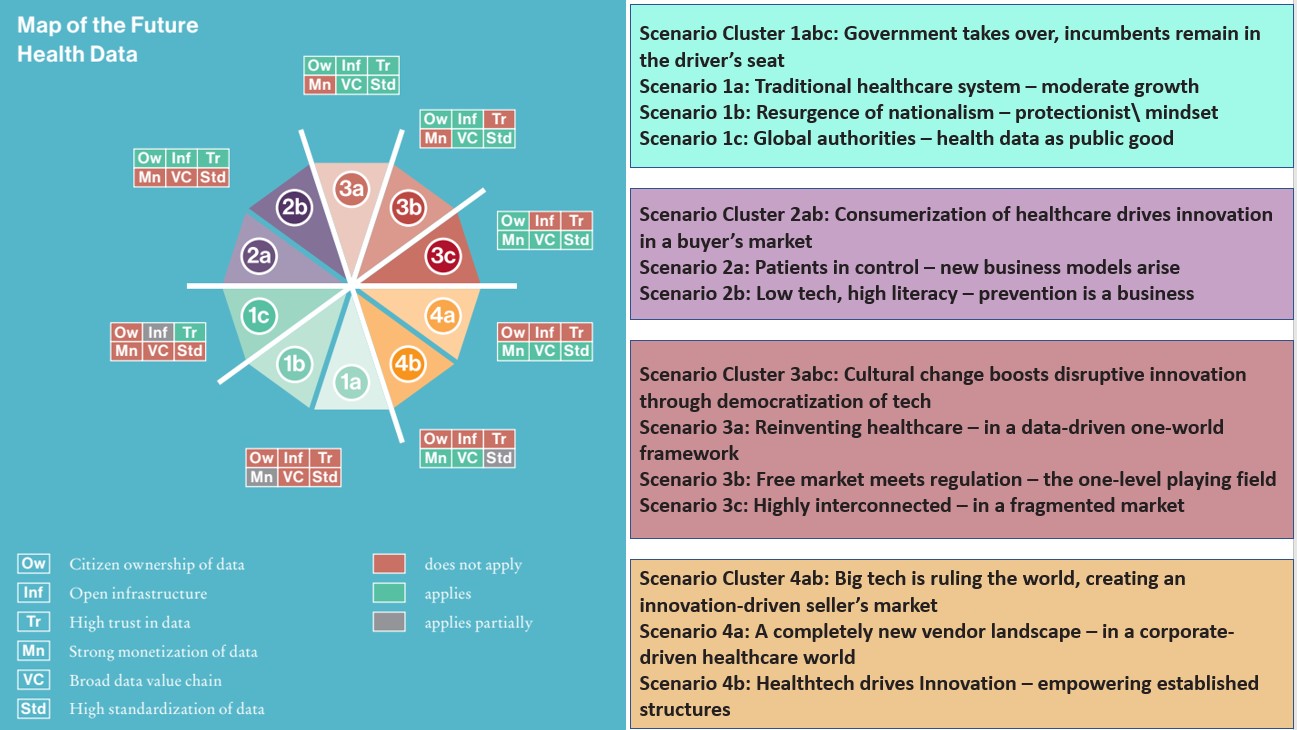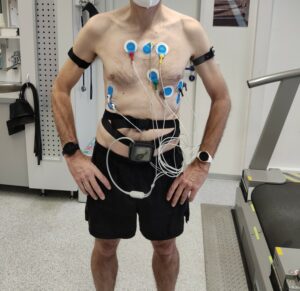Projects and Studies
-
01
aktivplan
Further informationThe aktivplan app is designed to support healthcare professionals and patients in planning activities.
-
02
MORE
Further informationModular Open Research Platform for Digital Health: An infrastructure to foster data-driven innovation
-
03
EXPEC
Survey of patients’ views on health-promoting exercise and cardiovascular disease.
The aim of this project is to explore the experiences and views of patients with cardiovascular disease on the topic of physical activity in cardiac rehabilitation. The focus is on gaining a deeper understanding of contexts and expectations for health-promoting sustainable behavior change. Modes of action and possible applications for innovative digital technologies will be discussed from the perspective of patients.
You can find the summary of the results here
Contact:
Dr. Stefan Tino Kulnik, Ludwig Boltzmann Institute for Digital Health and Prevention, gvab.xhyavx@quc.yot.np.ng -
04
HEALTH
Survey of the view of physicians and other health professionals.
The aim of this project is to explore problems and possible solutions for the sustainable promotion of physical activity in the context of cardiological rehabilitation. Views and experiences of physicians and staff from other health care professions will be collected. The focus is on possible areas of application and advantages in the use of innovative digital technologies.
Contact:
Dr. Stefan Tino Kulnik, Ludwig Boltzmann Institute for Digital Health and Prevention, gvab.xhyavx@quc.yot.np.ng -
05
SmartPA
SmartPA is a series of studies we are working on together with the Paris Lodron University Salzburg (Prof. Jens Blechert). In a first step, we investigated which factors can facilitate or impede health-promoting physical activity (PA) in everyday life. To this end, the study participants were questioned four times a day via smartphone about their momentary state and their PA. The exact content of these surveys was developed on the basis of motivational psychological theories and models of health behavior. Results showed that participants successfully enacted 75% of their PA intentions. In addition, the specificity of their planning was particularly relevant to whether an exercise intention was successfully put into practice.
Find the publication here
Based on these results, we are now developing an intervention to support individuals in adhering to their exercise intentions by stimulating planning processes when adherence to an exercise intention appears to be at risk due to other circumstances. As part of a SmartPA follow-up study, we will implement this intervention in Aktivplan, evaluate it, and further develop it according to the study results. In addition, the study will also feature the collection of external factors, such as weather or calendar availability, which might influence PA engagement. In the future, such factors could be used to adapt interventions to users’ contexts and identify opportunities or risks for the enactment of PA intentions at an early stage.
Project Lead:
David Haag, MSc, Pre-Doc, qnivq.unnt@quc.yot.np.ng
-
06
Data Protection
The project is responsible for developing the legal framework in the area of data protection and security. In particular, the Medical Devices Act and the General Data Protection Regulation (GDPR) must be taken into account for the work of the LBI. Accordingly, a strategy for the protection of highly sensitive personal data (e.g., medical data, wellness, lifestyle, and behavior) is being developed at both the institutional and technical levels. In addition, the team is also developing a roadmap to implement person-centric privacy functionalities (for e.g. digital health apps) that provide users with more control in the management and sharing of their data.
We created a toolkit to facilitate the proper General Data Protection Regulation (GDPR) implementation and compliance in digital health. The toolkit consists of four categories:
- Awareness: GDPR tutorials and training materials
- Organizational compliance: a regulatory framework including policies, contractual templates, and checklists for institutional GDPR compliance
- GDPR implementation in digital health: a detailed roadmap for the GDPR technical implementation and compliance in mHealth, including compliance strategy and action plan.
- Practicing GDPR individual rights: guidelines, user forms, and flowcharts for supporting the mHealth user.

Contact:
Rada Hussein PhD, FIAHSI, Ludwig Boltzmann Institute for Digital Health and Prevention, enqn.uhffrva@quc.yot.np.ng -
07
Digital Health Roadmap and Open Innovation in Science
Health Data democratization project
We adopt the Open Innovation in Science (OIS) approach to strengthen public and patient involvement and engagement. Thus, we realize the implementation of patient and citizen participation in research activities, for example:
- We conducted a co-creation workshop on health data democratization (April 2021). Patients addressed their concerns and proposed solutions addressing health data protection, transparency, and building trust. The output of this workshop, along with the Digital Health Europe consultation paper (on citizen-controlled health & data sharing governance) frame the DH-Convener PGHD data-sharing governance model.
- We established a fruitful collaboration with DayOne (the Healthcare Innovation hub initiative managed by Basel Area Business & Innovation). We actively participate in the Health Data Futures event series that aims to provide actionable recommendations to accelerate digital health innovation. We also collaboratively organized and conducted a workshop on future data scenarios for the European Health Data Space (EHDS) during MIE2022. The results of this workshop are summarized in a journal article submitted to the International Journal of Medical Informatics- The official journal of the European Federation for Medical Informatics (EFMI).

Contact:
Rada Hussein PhD, FIAHSI, Ludwig Boltzmann Institute for Digital Health and Prevention, enqn.uhffrva@quc.yot.np.ng -
08
Digital Health (DH) Convener
Further informationIn May 2020, LBI participated in the Nexus Digital Health Innovation Challenge of the Federal Ministry for Climate Protection, Environment, Energy, Mobility, Innovation and Technology (BMK) with the DH Convener project. The project was selected as the winner among 8 finalist projects for the use case dealing with future health data organization. On June 22, the LBI team attended the BMK workshop to present the project and receive the necessary support to make it a reality. The Institute plans to implement the DH-Convener pilot project in Salzburg over the next 3 years in close collaboration with all LBI-DHP partners and stakeholders. DH-Convener is an open platform for digital health apps to organize, protect and integrate health data. The platform provides interoperability and privacy as a service for:
Connecting digital health services by integrating patient data into electronic health records (ELGA).
Delivering integrated care by supporting clinical care along with mobile health and wellness services
Sharing data with global and public health registries by participating in global epidemic control and surveillance programs
Compliance with the General Data Protection Regulation (GDPR)
Contact:
Rada Hussein PhD, FIAHSI, Ludwig Boltzmann Institute for Digital Health and Prevention, enqn.uhffrva@quc.yot.np.ng -
09
ValOpti
Assessment of the validity and reliability of commercially available optical heart rate sensors to measure the amount and intensity of physical activity.
Physical inactivity is a major risk factor for cardiovascular disease, but at the same time this risk factor is modifiable through lifestyle interventions. The World Health Organization recommends 150-300 minutes of moderate or 75-150 minutes of vigorous physical activity per week, or an appropriate combination of these activity targets. As a basis for personalized lifestyle interventions or as a measure in studies, data on physical activity have been collected in the past mainly by means of an oral interview or a questionnaire. However, overestimation, recall, and perceptual errors severely limit the measurement accuracy (validity) of such surveys. Medical societies therefore recommend assessing physical activity by including objective measures such as heart rate. This allows not only an objective assessment of the amount of physical activity, but also of the intensity of exertion.
Portable sensors, so-called “wearables” offer a new possibility to record heart rate continuously and comfortably using optical sensors. However, the validity of such sensors has been assessed very differently in studies, largely due to the different study formats and methodology used.
The objective of this study is to establish a comprehensive, standardized, and feasible validation protocol for commercially available optical heart rate sensors under laboratory and everyday conditions and to apply this protocol to assess the validity of four commercially available optical heart rate sensors.Contact:
Priv.-Doz. Dr. Dr. Mahdi Sareban, znuqv.fnerona@quc.yot.np.ng
-
10
HERO
The Heart Rehab Information Tool
Further InformationDesigning a digital prototype to support patients’ pathway to cardiac rehabilitation.
In three consecutive workshops, we collected content for the referral assistant and already prototyped some ideas. We took away interesting discussions around cardiac conditions and a lot of inspiration for the digital prototype. Based on the workshop results, the next step will be to develop an app for cardiac patients.

Project Lead:
Isabel Höppchen MSc, Pre-Doc Vfnory.Ubrccpura@quc.yot.np.ng -
11
Ganz Salzburg Bewegen
Get all of Salzburg moving
Further informationThe World Health Organisation recommends a certain minimum amount of regular heart-healthy physical activity, but Austrian national statistics show that less than half of the general population adhere to these physical activity recommendations. Certain sub-groups display physical activity levels below the population average: ages 30-44 years, retirees, and people with migration background, lower income, or lower education level.
Ganz Salzburg Bewegen [“Get all of Salzburg moving”] addresses the question how these under-served groups in Salzburg can best be supported to engage in regular heart-healthy physical activity and exercise. The purpose of the project is to reach out and enter an in-depth involvement and knowledge-exchange process with citizens, to generate co-designed suggestions for supporting regular heart-healthy physical activity and exercise in their communities.
This involvement and exchange process will take place in the Lehen district in Salzburg during three public events in spring, summer and autumn 2023. The “community conversation” event will start off the exchange with citizens, the ideas workshop will offer a forum for collating and co-designing citizens’ suggestions, and the concluding interactive exhibition will present suggested solutions for a public vote. In parallel, citizens have the opportunity to join the project team as co-researchers and take the lead in certain project activities.
The project will result in a collection of potential solutions for supporting regular heart-healthy physical activity, based on the lived experience of citizens from under-served groups, with the aim to implement and evaluate one or more of these co-created solutions in a subsequent project.
Ganz Salzburg Bewegen is a collaboration between Salzburg University of Applied Sciences, Ludwig Boltzmann Institute for Digital Health and Prevention, the City of Salzburg, and the County of Salzburg. The project is funded by Salzburg University of Applied Sciences, the City of Salzburg, the County of Salzburg, and the Ludwig Boltzmann Gesellschaft Open Innovation in Science Center (Open Innovation in Science Enrichment Fund).
Contacts:
Dr. Melanie Roth, Salzburg University of Applied Sciences, zrynavr.ebgu@su-fnymohet.np.ngDr. Stefan Tino Kulnik, Ludwig Boltzmann Institute for Digital Health and Prevention, gvab.xhyavx@quc.yot.np.ng
-
12
DIGI:GREEN
Digital & Green Prevention and Rehabilitation
Further InformationInnovative prevention and rehabilitation concepts with natural health resources and digital health applications are the focus of the research project “DIGI:GREEN – Digital & Green Prevention and Rehabilitation” funded by the province of Salzburg.
-
13
IDERHA
Improving clinical decision-making and enhancing patient access to health innovations through better use of health data.
Further informationContact:
Rada Hussein PhD, FIAHSI, Ludwig Boltzmann Institute for Digital Health and Prevention, enqn.uhffrva@quc.yot.np.ng
Project Collaborations
-
01
H2O Project
Further information
The LBI-DHP participation in the H2O project – as an associated collaborator – will create synergy with the DH-Convener project for integrating Patient-Generated Health Data (PGHD) with ELGA.
The Health Outcomes Observatory (H2O) -EU Innovative Medicines Initiative 2 (IMI2)- project aims to strengthen the patient voice in health care. The H2O project is led by the pharmaceutical company TAKEDA and coordinated by the Medical University of Vienna (MUW). The LBI-DHP, as an H2O associate collaborator, will participate with the project consortium (over 20 partners from 12 different countries) in creating a robust data governance model that empowers patients to have control of their data. With patient consent, ethical and secure analysis of the data can be performed for the interest of society, science, and patient care.
The H2Os are initially being created in four countries – Netherlands, Austria, Germany and Spain – covering three diseases (cancer, diabetes and inflammatory bowel disease). This will be followed by extending the concept across Europe and to other diseases.
The LBI-DHP will collaborate with MedUni Wien in developing the H2O Austrian physician/healthcare provider portal and the associated H2O Austrian observatory.
Contact:
Rada Hussein PhD, FIAHSI, Ludwig Boltzmann Institute for Digital Health and Prevention, enqn.uhffrva@quc.yot.np.ng
Completed Projects
-
01
Connect2Move
Interreg Österreich-Bayern, AB296
Further information
The consortium project Connect2Move (under the overall coordination by the TU Munich) will be dedicated to the valorization of natural and evidence-based cardio-trekking trails through open innovation methods for the sustainable promotion of intergenerational, health-oriented tourism. In the next 30 months, a clinical study will be conducted to define a test route that can be used to determine the current training status of hikers and thus avoid dangerous overstraining during subsequent hiking. With the help of modern technologies, individual recommendations for special cardio-trekking hiking routes in the partner regions Werfenweng and Aschau im Chiemgau will then be given, based on the results of the test route.
-
02
CODIS
Impact of the COVID-19 curfews on patients undergoing cardiac rehabilitation.
Cardiac rehabilitation and group cardiovascular exercise, both important interventions for patients with cardiovascular disease, have been largely unavailable during the past several months. This project captures effects of the COVID-19 exceptional situation on patients’ physical performance and level of physical activity, as well as patients’ subjective experience of this period. The goal is to gain insights to optimize the support of patients in physical activity and training at home using digital technologies. This project is made possible by a COVID-19 related grant from the Open Innovation in Science Center of the Ludwig Boltzmann Gesellschaft.
Contact:
Dr. Stefan Tino Kulnik, Ludwig Boltzmann Institute for Digital Health and Prevention, gvab.xhyavx@quc.yot.np.ng